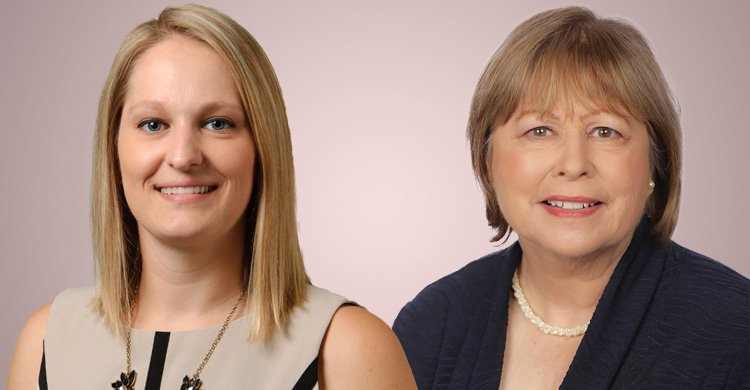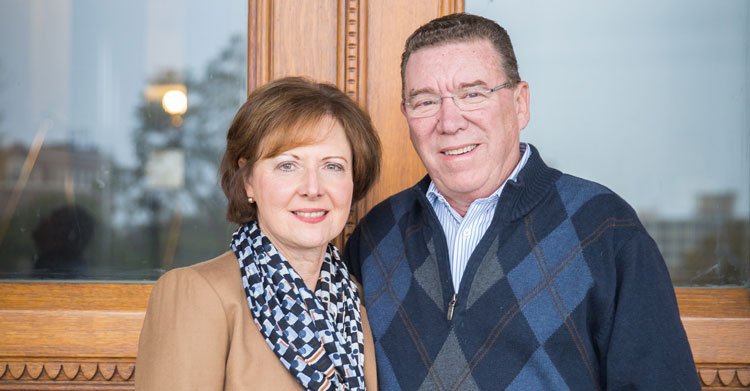Foundation Chat: The Future of Pharmacy with Dr. Marie Smith and Dr. Kate Steckowych

Most people would admit that the only time they interact with a pharmacist is picking up prescriptions at their local pharmacy. But that’s only part of the story.
According to Dr. Marie Smith ’77 (PHR), consumers see their pharmacist an average of 10 times more frequently than their primary care physician, meaning the pharmacist can play a crucial role in patient care.
As the Dr. Henry A. Palmer Endowed Professor in Community Pharmacy Practice, Dr. Smith researches ways in which pharmacists–and the overall transformation of pharmacy practice–can impact team-based healthcare delivery in community settings. She recently created a fellowship that’s currently held by Dr. Kate Steckowych ’13 (PHR), ’15 Pharm.D. The two are studying pharmacy practice transformation, specifically the integration of pharmacists in community-based health care settings, such as the primary care doctor’s office, and the communications between community pharmacists and primary care clinicians.
The UConn Foundation had the opportunity to sit down with the two researchers and alumnae to discuss their work.
How did this fellowship come about?
A. (Dr. Smith) It was a professional goal of mine to “pay it forward” and bring on another generation of pharmacist practitioner-researchers. Given the current changes in health care, I thought we should focus the fellowship on pharmacy practice transformation.
Q. What is the study of “practice transformation” and what are “patient care teams?”
A. (Dr. Smith) There are two aspects of practice transformation. First, we look at how health care is delivered today, and second, we look at how we pay for health care. We want to make sure that other health care professionals, payers, policy makers, and consumers understand how pharmacists can bring their unique skills and clinical expertise to health care teams.
In primary care settings, many times when somebody says we have team-based care, that means a doctor and nurse practitioner working together. What we’re seeing now in healthcare is that the team needs to be established around a patient’s specific care needs. If more than half your patients are taking multiple chronic medications, how can the pharmacist contribute as a team member? A pharmacist’s expertise in medication optimization and management is complementary to the skills of physicians and nurses practitioners. Pharmacists focus on identifying and resolving any medication-related problems, and avoiding unnecessary medication-related hospitalizations and emergency department visits.
Q. What are the challenges and opportunities facing the practice of pharmacy today?
A. (Dr. Steckowych) I think one of the challenges is recognizing what pharmacists bring to the table and how to best incorporate them into existing care teams. Based on a project Dr. Smith and I conducted this past year, it’s evident that patients don’t fully understand the value of their pharmacist as a member of their community healthcare team. Most patients still see pharmacists primarily as medication dispensers. They don’t realize that pharmacists check prescriptions for possible drug interactions or adverse reactions, and make recommendations to physicians when a safer medication is needed.
Q. What are the goals of your research?
A. (Dr. Smith) Our overall goal is to improve medication use and safety. In one project, we had students assisting us in a study of four common medication-related activities performed in a primary care doctor’s office. These activities included getting an accurate patient medication list, medication refills, managing blood thinners and vaccinations, and medication communications between a physician office and community pharmacies. Our findings led to some recommendations in medication-related workflow processes and efficiency, as well as providing educational resources for physicians, nurses, and medical assistants.
This type of health services research – collecting data in a “real-world” care setting to improve the quality of medication-related practices — also opened the eyes of the students to practice-based research that a pharmacist can perform. You could see the light bulb go off as students said, “this is really great, I didn’t know this was considered research.” It’s had an impact on our students, which I think is part of our mission as educator-researchers. Students were able to feature their research project as part of their job or pharmacy residency interviews.
Q. How does it feel to know you’ve made such an impact on students?
A. (Dr. Steckowych) It’s very gratifying to see that I have made an impact on the students whom I’ve worked with over the past year. I know that the type of research that I conduct is not commonly known to students and sometimes others within our profession. I am grateful that I have been able to incorporate students into my research endeavors and provide them with an understanding of what practice transformation looks like.
Q. You’re both UConn alumnae. What is it like to come back and conduct this research at your alma mater?
A. (Dr. Smith) First, I’ll just say it was very much an honor to come back to UConn as a faculty member and to be named the Palmer endowed professor. Dr. Henry Palmer was one of my professors at UConn— so it had another level of meaning to me. Dr. Palmer was always encouraging students to find new ways that pharmacists could work closer with patients and other health care professionals. Also, he was very interested in expanding pharmacist services. Overall, it’s been a great opportunity to come back and conduct research that can facilitate new opportunities for pharmacists.
(Dr. Steckowych) What I was most excited about with coming back is applying what I’ve learned in my postgraduate training to health care transformation here in Connecticut. I’m very excited to be back at UConn and be doing things that I love doing.
Q. The Palmer Fund is still actively accepting donations. What would you say to potential donors as to why they should give?
A. (Dr. Smith) Sometimes when you’re on the leading edge of doing practice-based research, it’s still too new for many organizations to fund. So, the Palmer Fund allows us to be more forward-thinking when we don’t have other sources of funding. The Palmer Fellowship is 100 percent funded through the Palmer Fund, so we rely heavily on the funds that are available to us from donors.
(Dr. Steckowych) Without donor support, this postgraduate fellowship training experience would not be possible. I’m very grateful for the continued support of this fund, otherwise myself and future fellows wouldn’t have this opportunity to learn more about practice transformation.

